WhatsApp communities vs groups: Differences, benefits, and limitations explained
Explore the difference between WhatsApp Groups and Communities. Understand their benefits and limitations. Discover the suitable feature for your business.
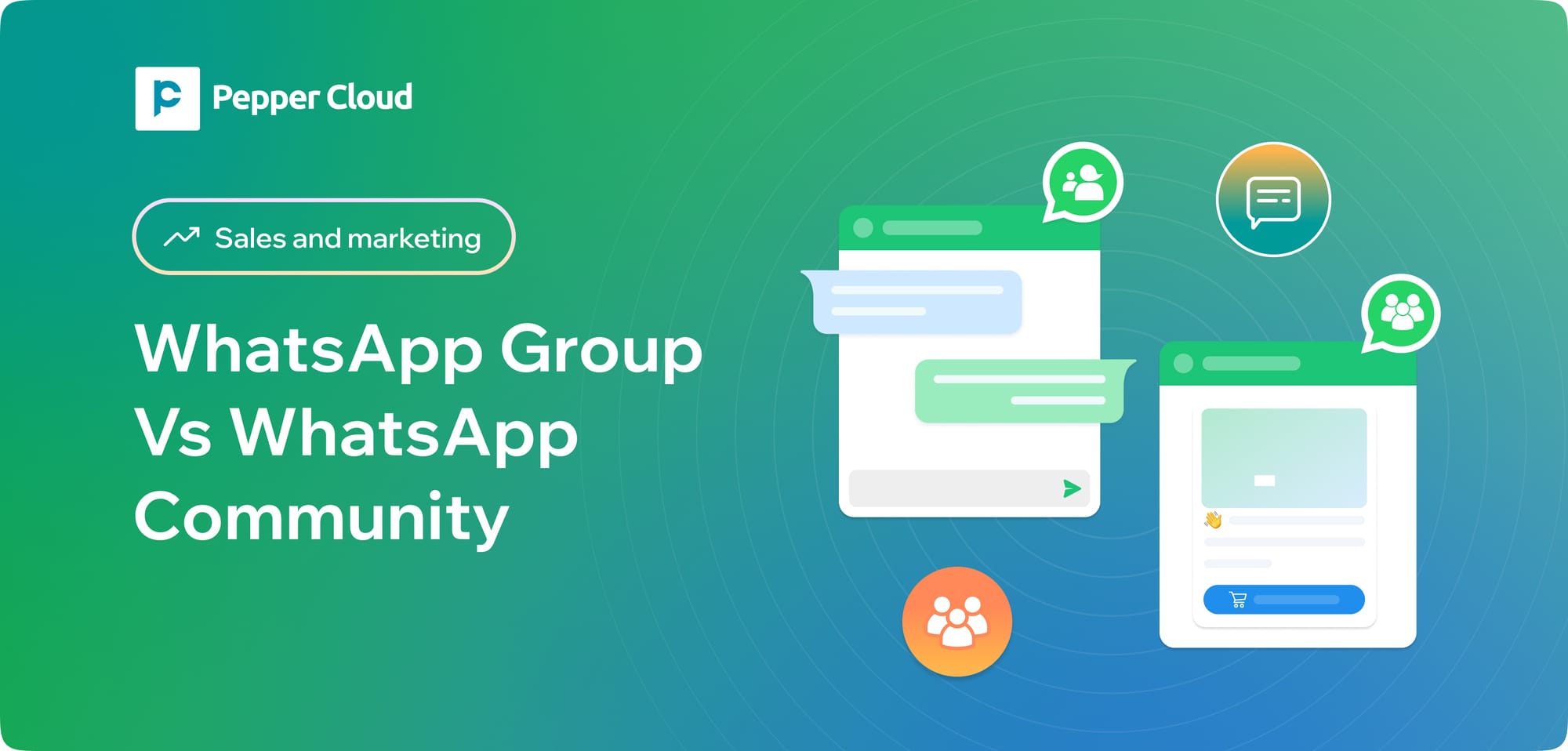
WhatsApp has emerged as a powerful tool for businesses to connect, engage, and support their customers. However, as business needs evolve, WhatsApp has introduced two distinct features—WhatsApp Groups and WhatsApp Communities—to cater to different communication models.
While both options facilitate group interactions, they serve very different purposes. WhatsApp groups are designed for direct, interactive discussions, making them ideal for businesses that rely on real-time engagement. On the other hand, WhatsApp communities focus on large-scale communication, offering structured message distribution across multiple sub-groups.
But which one is better for your business? More importantly, how can you leverage these tools effectively? This article will explore the key differences, benefits, and limitations of WhatsApp groups and communities. We will also discuss how Pepper Cloud WhatsApp CRM empowers businesses by enhancing group communication and ensuring seamless customer engagement.
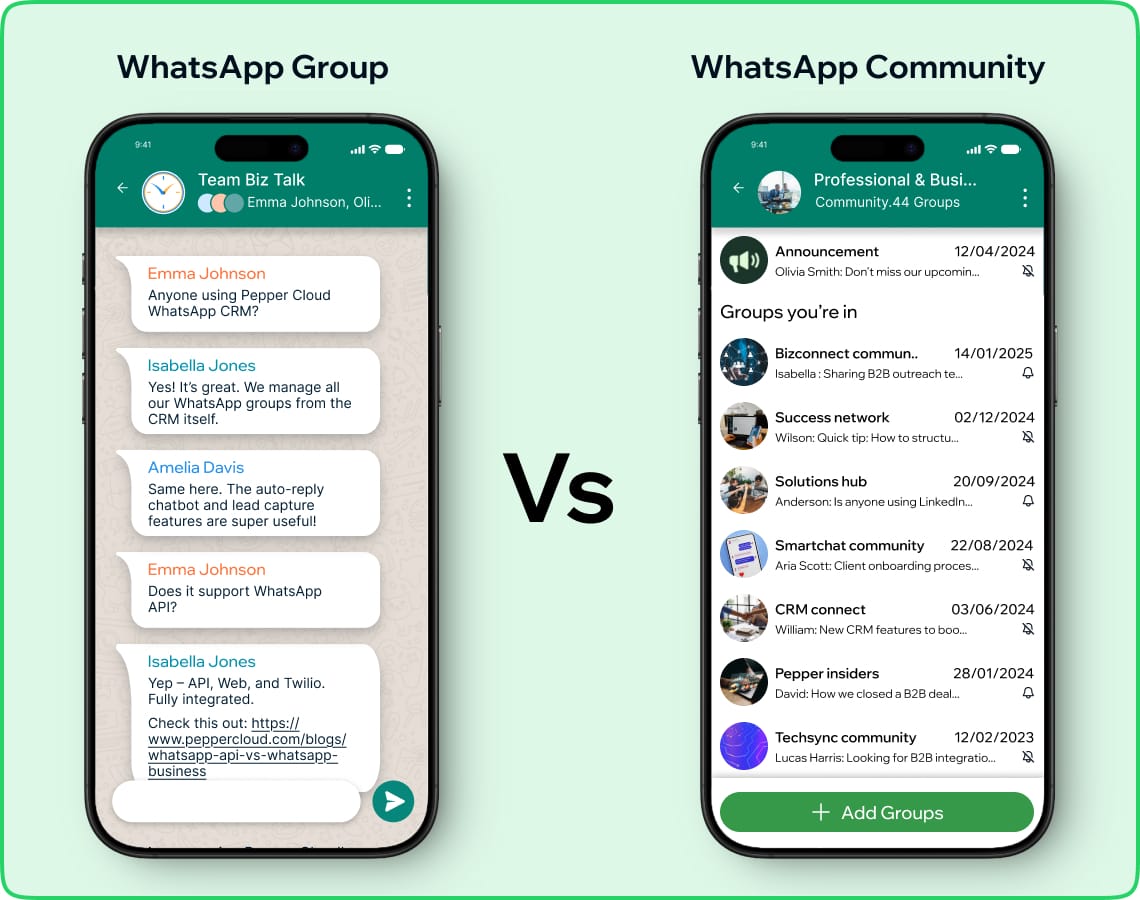
What are WhatsApp groups?
WhatsApp groups provide businesses with a dedicated space for real-time communication, allowing up to 1,024 members to engage in discussions, share updates, and collaborate efficiently. They function as interactive chat rooms where every participant can contribute, making them ideal for customer support, marketing, internal teamwork, and event coordination.
Businesses use WhatsApp groups to address client queries, run promotions, coordinate with teams, and streamline operations. Admins have control over group settings, including adding or removing members, managing permissions, and setting group descriptions, ensuring smooth and organised discussions. With two-way communication and instant notifications, WhatsApp groups offer a more personal and direct engagement model compared to broader community structures.
Despite their benefits, WhatsApp groups have some scalability and management limitations, especially when handling larger audiences. However, with the right tools, businesses can optimise group interactions, automate responses, and integrate WhatsApp with their sales and support systems to improve efficiency.
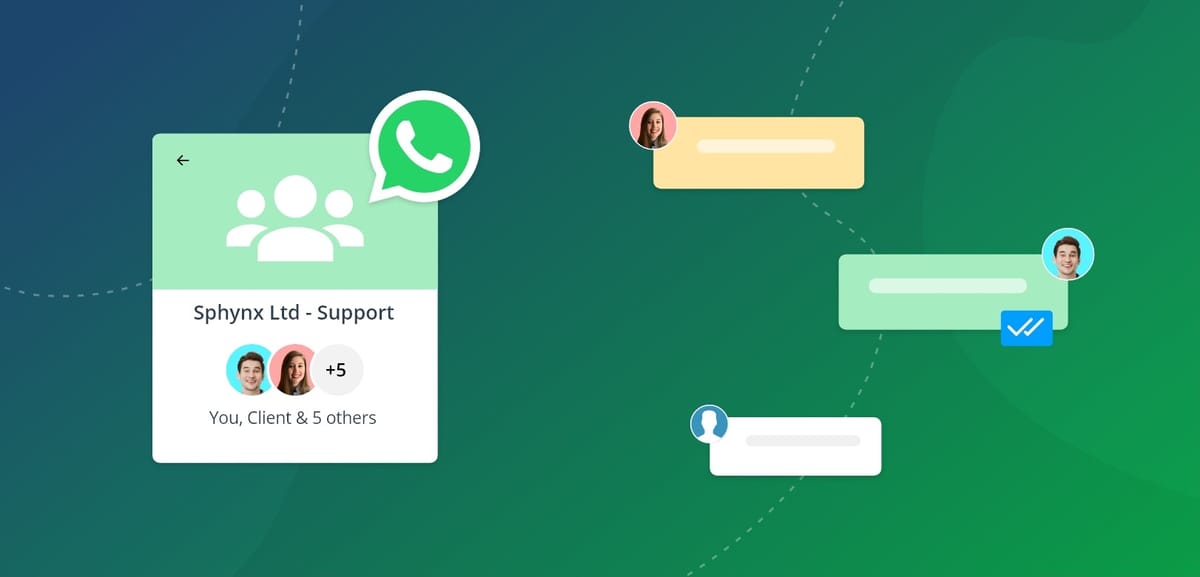
What is community in WhatsApp?
WhatsApp communities are designed for large-scale communication, allowing multiple groups to be linked under a single network. This feature is particularly useful for organisations, educational institutions, and enterprises that need a structured way to manage multiple conversations.
Within a community, admins can broadcast announcements to all members through a dedicated announcement group, while sub-groups allow focused discussions on specific topics. Unlike WhatsApp groups, where members can freely interact, communities prioritise top-down communication, making them less interactive and more suited for structured messaging.
A WhatsApp community can include up to 50 sub-groups, with each group supporting 1,024 members, enabling businesses to manage up to 51,200 members within a single organised structure. While this setup ensures better control over large audiences, it lacks the personal engagement needed for direct customer interactions, making it less ideal for businesses focused on relationship-building and real-time communication.

Key differences between WhatsApp communities and groups
Understanding the differences between WhatsApp communities and groups is crucial for businesses choosing the right communication tool. Here are the key distinctions:
- Group size and structure:
- WhatsApp groups can accommodate up to 1,024 members, making them ideal for businesses managing smaller, focused customer segments.
- WhatsApp communities can include up to 50 sub-groups, enabling businesses to manage a network of up to 51,200 members, but they lack direct engagement between members.
- Admin controls and permissions:
- WhatsApp groups allow multiple admins with complete control over adding or removing members, managing permissions, and modifying group settings.
- WhatsApp communities have more rigid admin roles, limiting direct interaction and focusing on overall group management rather than personalised control.
- Communication flow:
- WhatsApp groups support two-way, real-time communication, enabling businesses to interact directly with customers.
- WhatsApp communities function top-down, where only admins can send messages in the announcement group, making them better suited for mass updates rather than conversations.
- Engagement and interaction:
- WhatsApp groups encourage direct engagement, allowing businesses to build stronger relationships with customers through discussions and feedback.
- WhatsApp communities restrict interaction, limiting the ability to foster meaningful connections with members.
- Use cases for businesses:
- WhatsApp groups are best for customer support, marketing campaigns, team collaboration, and event coordination, where interaction is key.
- WhatsApp communities work better for large-scale announcements, such as updates for schools, corporate organisations, or associations needing structured messaging rather than engagement.
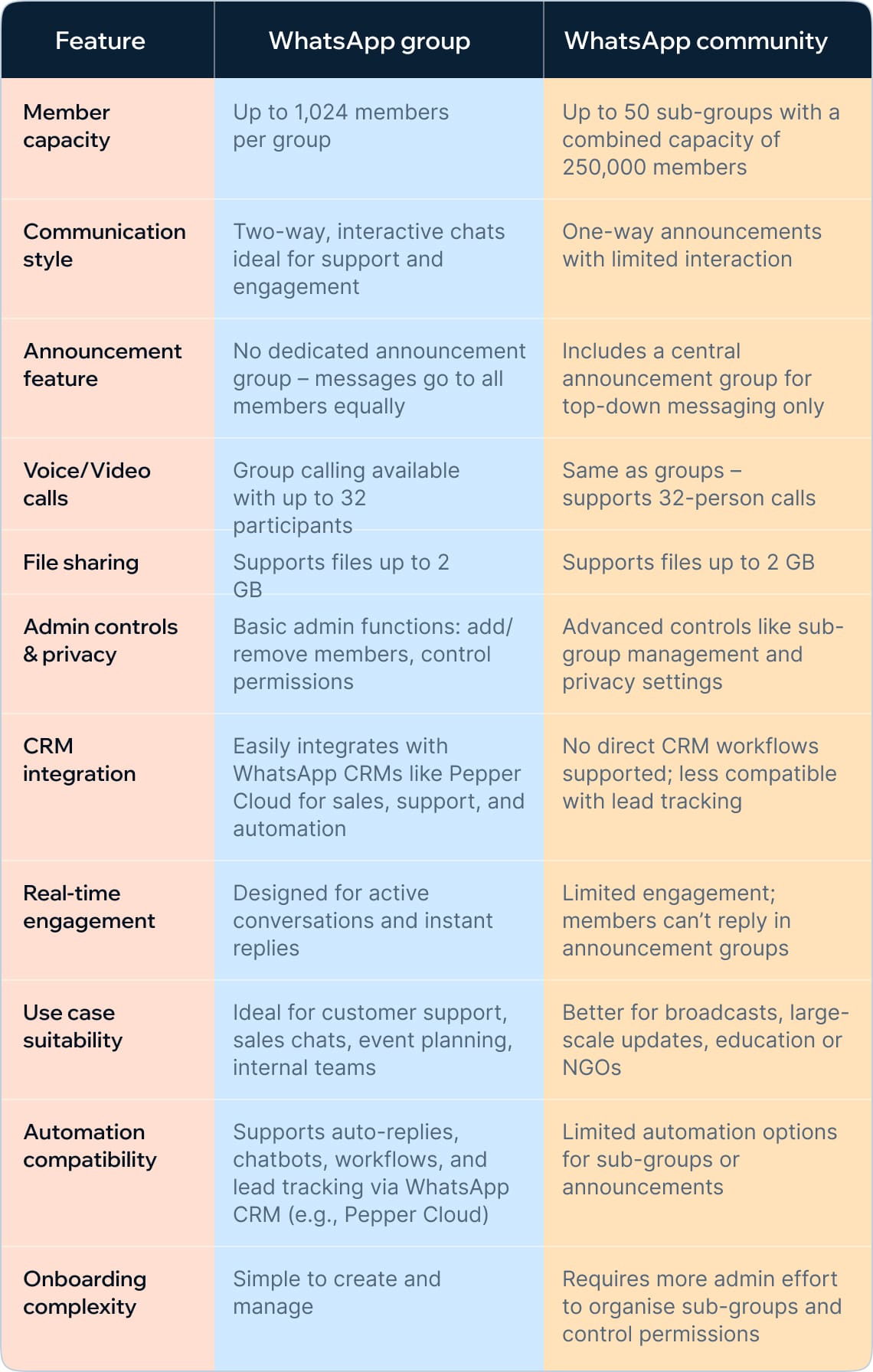
Benefits of WhatsApp groups over WhatsApp communities
WhatsApp groups offer several advantages over communities, particularly for businesses that rely on direct engagement and interactive communication.
- Personalised communication: Groups allow businesses to connect one-on-one with customers, enabling real-time responses to queries and building stronger relationships.
- Better collaboration: Whether for team coordination or project management, groups facilitate seamless discussions, task assignments, and quick decision-making.
- Higher engagement: Unlike communities, where communication is largely one-way, groups encourage active participation, keeping customers and team members involved in discussions.
- More control for admins: Admins in groups have greater flexibility in managing conversations, moderating discussions, and ensuring a more interactive environment.
- Integration with business tools: Groups can be enhanced with CRM integrations, allowing businesses to automate responses, track interactions, and streamline customer communication.
For businesses prioritising engagement, collaboration, and direct customer relationships, WhatsApp groups provide a more interactive and effective solution compared to communities.
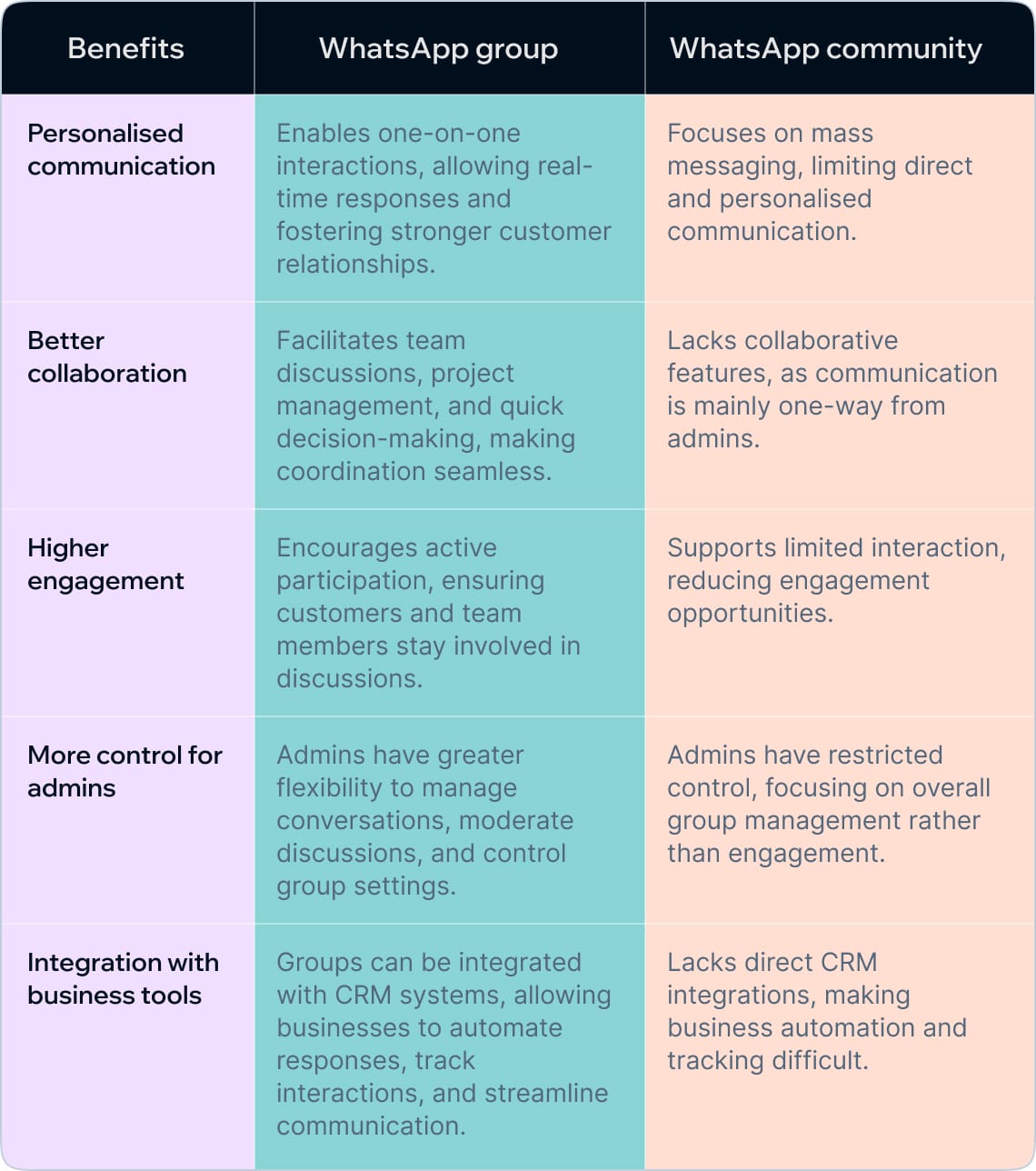
Limitations of WhatsApp communities over groups
While WhatsApp communities offer structured messaging for large-scale communication, they come with limitations that may not suit growing businesses needing direct engagement and flexibility.
- Limited two-way communication: Communities restrict direct interactions, making it difficult for businesses to engage customers in real-time discussions or provide personalised support.
- Less engagement: With top-down communication, communities reduce interaction levels, which can lead to lower customer involvement compared to WhatsApp groups.
- Complex setup and management: Managing multiple sub-groups under a community requires additional admin effort, making it less practical for smaller businesses or teams with limited resources.
- Lack of personalised interactions: Businesses relying on relationship-building and customer engagement may find communities impersonal and ineffective for fostering strong connections.
- Dependence on announcement groups: Since only admins can broadcast messages, members may feel disconnected from the conversation, leading to lower responsiveness and engagement.
For businesses that prioritise real-time interaction, direct communication, and strong customer relationships, WhatsApp groups provide a more effective and engaging solution compared to communities.
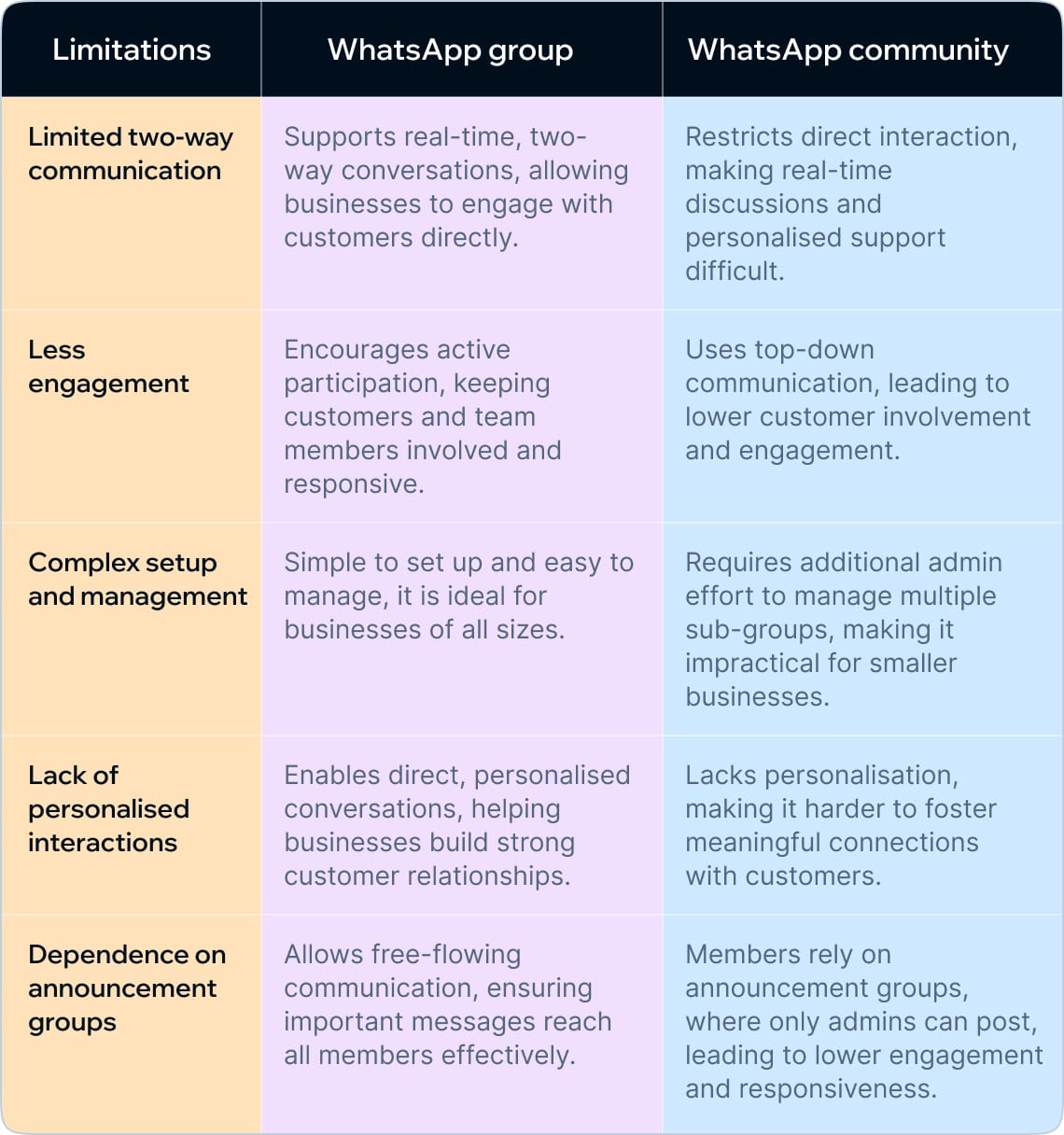
Use cases of WhatsApp groups for businesses
WhatsApp groups serve as a versatile communication tool for businesses, offering a direct and interactive way to connect with customers, teams, and event participants.
- Customer support and engagement: Businesses use groups for real-time customer support, allowing quick responses to queries and fostering stronger customer relationships.
- Sales and marketing campaigns: Groups help businesses promote exclusive offers, product launches, and interactive campaigns, keeping customers engaged with timely updates.
- Internal team collaboration: Teams rely on groups for project discussions, task management, and instant updates, ensuring seamless coordination and improved productivity.
- Event planning and coordination: Groups streamline event management by tracking RSVPs, sharing schedules, and addressing attendee concerns in real time.
For businesses that need direct communication, high engagement, and efficient collaboration, WhatsApp groups provide an effective and user-friendly solution.
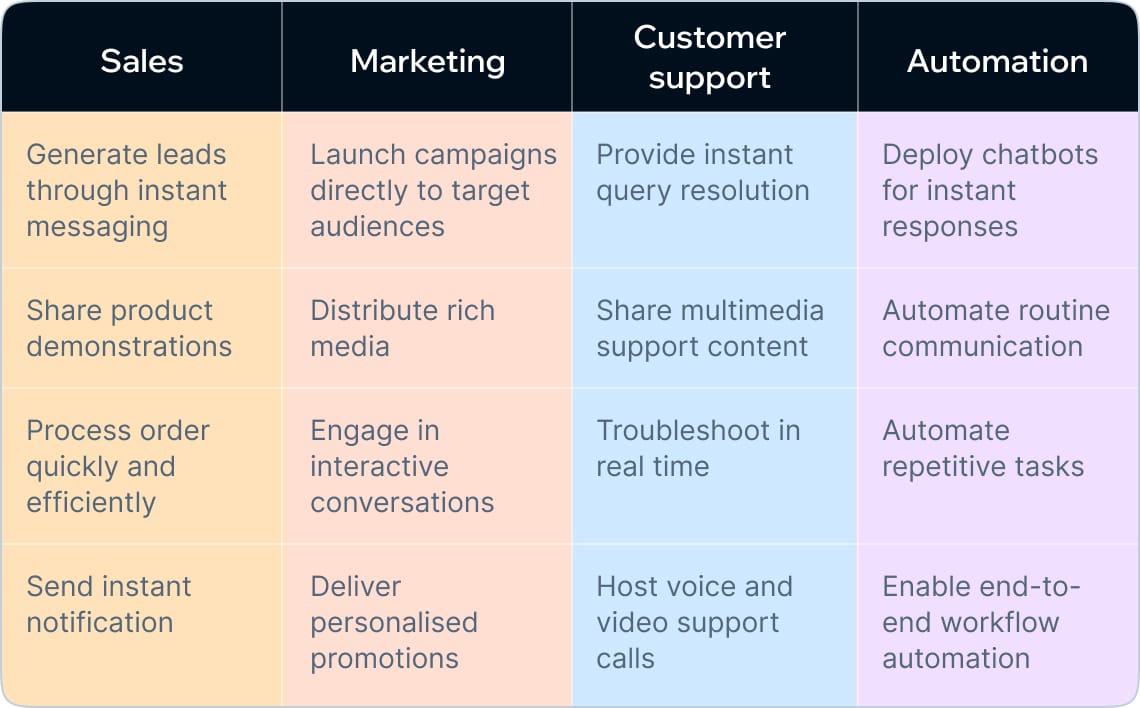
Pepper Cloud - WhatsApp CRM to manage WhatsApp groups
Pepper Cloud WhatsApp CRM empowers teams to take WhatsApp group communication to the next level. Designed for scalability and efficiency, it allows businesses to manage, automate, and streamline WhatsApp interactions right from within the CRM.
- Manage WhatsApp groups within CRM: Create, monitor, and manage WhatsApp groups directly from the CRM for complete control and organisation.
- Lead capture from WhatsApp: Automatically collect leads from WhatsApp group conversations and add them to your CRM system.
- Associate messages with businesses and opportunities: Link WhatsApp conversations with accounts, contacts, or deals to ensure context-driven follow-ups.
- Auto-responses with chatbot: Configure intelligent chatbot replies triggered by phrase match to handle FAQs and improve response time.
- User permissions and profile-based access: Control who can view, access, or manage WhatsApp group interactions based on user roles and permissions.
- WhatsApp integration options: Seamlessly connect using WhatsApp API, WhatsApp Web, or WhatsApp Twilio to suit your business model. Learn more about integration methods
- Automated message scheduling: Plan and schedule group messages in advance, ensuring timely updates, reminders, and broadcasts.
- CRM, sales, and support integration: Sync WhatsApp group conversations with your sales and support teams to maintain alignment and speed up resolution.
- Real-time engagement and collaboration: Enable direct, two-way communication with customers, making WhatsApp groups ideal for relationship-building.
Looking to boost engagement, speed up workflows, and deliver better customer service? Pepper Cloud WhatsApp CRM turns WhatsApp groups into a powerful business asset.

Conclusion
Choosing between WhatsApp groups and WhatsApp communities depends on your business communication needs. WhatsApp Groups are ideal for businesses that prioritise real-time engagement, customer support, marketing campaigns, and team collaboration, offering direct, two-way communication, and higher interaction levels. In contrast, WhatsApp Communities provide structured, large-scale messaging, making them better suited for organisations needing mass announcements and controlled communication.
For businesses looking to maximise the potential of WhatsApp groups, Pepper Cloud’s WhatsApp CRM offers automation, integration with business tools, and enhanced customer engagement, making group communication more efficient and impactful. By leveraging the right WhatsApp feature, businesses can strengthen customer relationships, improve internal collaboration, and drive better communication outcomes.







